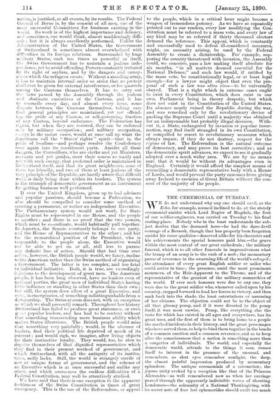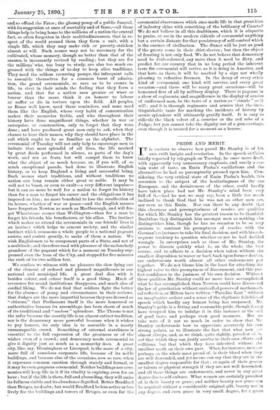THE CEREMONIAL OF TUESDAY.
WE do not understand why any one should cavil, as the Echo, for example, seemed inclined to do, at the stately ceremonial amidst which Lord Napier of Magdala, the first of our soldier-engineers, was carried on Tuesday.to his final resting-place. Nobody who in the least understands the sub- ject doubts that the deceased hero—he had the dare-devil courage of a Berserk, though that has properly been forgotten amidst his rarer qualities—deserved alike for his character and his achievements the special honours paid him,—the grave within the most central of our great cathedrals ; the military funeral, which is to all other funerals in impressiveness what the tramp of an army is to the rush of a mob; the momentary pause of reverence in the swarming life of the world's entrep4t ; the attendance of every great English soldier or sailor who could arrive in time ; the presence, amid the most prominent mourners, of the Heir-Apparent to the Throne, and of the representative of the greatest of the military monarchies of the world. If ever such honours were due to any one, they were due to the great soldier who, whenever called upon by his country, stepped forward to lead her forces to victory, and then sank back into the shade, the least ostentatious or assuming of her citizens. The objection could not be to the object of all that gloomy pomp, and if it were directed to the pomp itself, it was most unwise. Pomp, like everything else the taste for which has existed in all ages and everywhere, has its great uses, and the first of them is to bring home to a people the marked incidents in their history, and the great _personages who have served them, to help to bind them together in the bonds of a common emotion and a common reverence, and so to keep alive the consciousness that a nation is something more than a congeries of individuals. The world, and especially the democratic world, attends to the things it sees, rouses itself to interest in the presence of the unusual, and remembers, as shut eyes remember sunlight, the deep, the almost painful impression produced by momentary splendour. The antique ceremonials of a coronation; the joyous unity evoked by a reception like that of the Princess Alexandra—as well remembered now as when her carriage passed through the apparently indivisible waves of shouting Londoners—the solemnity of a National Thanksgiving, with its secret note of fear lest ephemerides should exult too much
mulso offend the Pates; the gloomy pomp of a public funeral, with its suggestion at once of mortality and of fame,—all these things help to bring home to the millions of a nation the central fact, so often forgotten in their multitudinousness, that in re- spect of the world around them they form a unit, with a single life, which they may make rich or poverty-stricken almost at mil. Such_ scenes may not be necessary for the cultivate& whose memory, though no better than that of the masses, is incessantly revived by reading ; but they are for the millions' who, too busy to study, are also too much en- grossed with the things of to-day to keep alive traditions. They need the seldom recurring pomps, the infrequent calls to assemble themselves for a common burst of admira- tion, the grand ceremonials, so rare as to be events in life, to rivet in their minds the feeling that they form a nation, and that for a nation men greater or wiser or braver than the mass, think it an honour to labour or suffer or die in torture upon the field. All peoples, as Rome well knew, need these reminders, and none need them like the English, whose very habit of concentration makes their memories feeble, and who throughout their history have done magnificent things, whether in war or enterprise, or construction, only to forget that they were done ; and have produced great men only to ask, when they chance to hear their names, why they should have place in the roll which ought to be as familiar as the alphabet. The ceremonial of Tuesday will not only help to encourage men to imitate that most splendid of all lives, the life marked by great deeds performed in silence, as parts of the day's work, and not as feats, but will compel them to know what the object of so much humour, or, if you will, of so much exceptional parade, had done to illustrate English history, or to keep England a living and successful being. Such scenes start traditions, and without traditions no nation can long remain either great or noble. It may be well not to boast, or even to exult—a very different impulse— but it can no more be well for a nation to forget its history than for a man to forget his career and the obligations it has imposed on him ; no more beneficial to lose the recollection of its heroes, whether of war or peace—and the English masses have forgotten Newton as much as Marlborough, and will for- get Wheatstone sooner than Wellington—than for a man to forget his friends, his benefactors, or his allies. The instinct which makes us attend the ceremonials in our friends' lives is an instinct which helps to cement society, and the similar instinct which summons a whole people to a national pageant assists, and assists greatly, to make of them a nation. We wish Englishmen to be component parts of a State, and not of a multitude, and therefore read with pleasure of the melancholy grandeur of the pageant which for a moment on Tuesday sup- pressed even the hum of the City, and stopped for five minutes the rush of its two million feet.
We confess we witness with no pleasure the slow dying out of the element of ordered and planned magnificence in our national and municipal life. A great deal dies with it besides colour, and colour itself is a good thing. Much of reverence for sound institutions disappears, and much also of cordial liking. We do not find that soldiers fight the better for the absence of pomp and circumstance in their reviews, that Judges are the more impartial because they are dressed as "citizens," that Parliament itself is the more honoured or authoritative because its assemblage has been shorn of much of its traditional and " useless " splendour. The Throne is not the safer because the courtly life is an almost extinct tradition, nor is the democracy more powerful because when it wishes to pay honour, its only idea. is to assemble in a nearly unmanageable crowd. Something of external stateliness is essential to the full expression of the greatness or of the wishes even of a crowd ; and democracy needs ceremonial to give it dignity just as much as a monarchy does. A great city, like, say, Birmingham or Liverpool, is the more of a city, more full of conscious corporate life, because of its noble buildings, and because also of the occasions, now so rare, when it expresses common emotion through stately and formal, or it may be even gorgeous ceremonial. Neither buildings nor cere- monies will keep life in it if its vitality is expiring, even for an hour ; but if the life is there, full and abounding, they will make its fullness visible and its abundance dignified. Better Bradford than Bru ges, no doubt; but would Bradford be less active or less lively for the buildings and towers of Bruges, or even for the ceremonial observances which once made life in that great hive of industry shine with something of the brilliancy of Courts ? We do not believe in all this drabbiness, which it is etiquette to praise, or see in the modern ridicule of ceremonial anything but a certain distaste for that persistency-of self-control which is the essence of civilisation. The dinner will be just as good if the vests come in their shirt-sleeves ; but then the object of feasting is not only food. We do not believe that democracy need be drab-coloured, any more than it need be dirty, and predict for our country that in no long period the inherent taste for ceremonial will revive, as it is doing in America, and that here, as there, it will be marked by a sign not wholly pleasing to reflective freemen. In the decay of every other kind of ceremonial, one kind will survive, and every great occasion—and there will be many great occasions—will be honoured first of all by military display. There is pageant in a show of regiments, and magnificence in the display of armies of uniformed men, be the taste of a nation as " simple " as it will ; and it is through regiments and armies that the inex- tinguishable taste for marking the incidents of history by scenic splendour will ultimately gratify itself. It is easy to ridicule the black velvet of a courtier or the red robe of a Judge; but you cannot take the dignity out of a gun-carriage, even though it is treated for a moment as a hearse.



















































 Previous page
Previous page